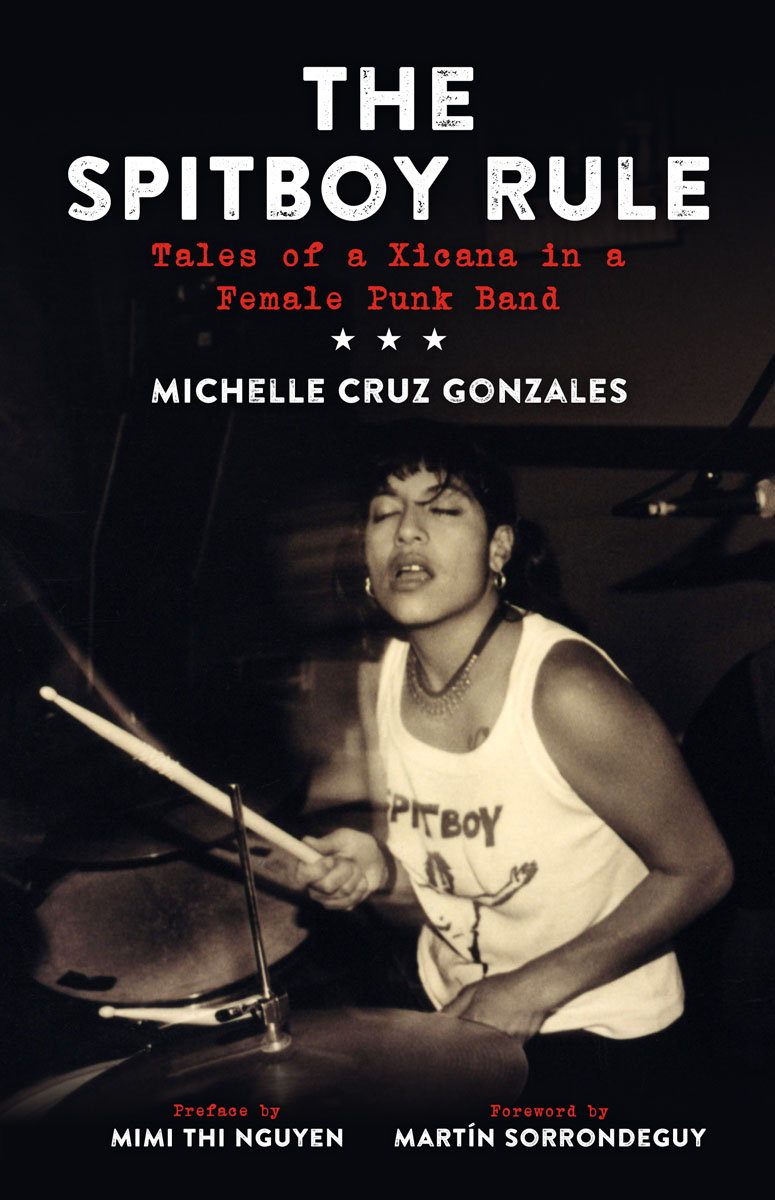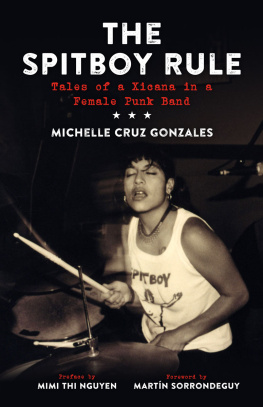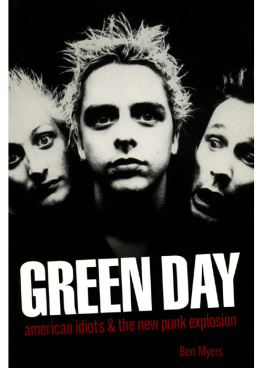
P RAISE
The Spitboy Rule is a compelling and insightful journey into the world ofturn-t 90s punk as seen through the eyes of a Xicana drummer who goes by the nickname Todd. Todd stirs the pot by insisting that she plays hardcore punk, not Riot Grrrl music, and inviting males to share the dance floor with women in a respectful way. This drummer never misses a beat. Read it!
Alice Bag, singer for the Bags and author of Violence Girl: East L.A. Rage to Hollywood Stage, a Chicana Punk Story
Incisive and inspiring, Michelle Cruz Gonzaless The Spitboy Rule brings the 90s punk world to life with equal parts heart and realism. Her story becomes a voyage of self-discovery, and Gonzales is the perfect guide as she writes in rapid-fire drum beats about epic road tours, female camaraderie, sexist fans, and getting accused of appropriating her own culture.
Ariel Gore, Hip Mama
Best punk memoir that Ive ever had the privilege of reading. In a punk scene dominated by middle-class, white males, you cant forget Spitboy, four brave women playing music with the intensity of an out-of-control forest fire. Gonzaless involvement and presence in the punk scene, in particular, was significant because she represented a radical, feminist person of color, and she reflected a positive change in the scene for the Bay Area. Her memoir, chronicling her unique experience and perspective, occupies an important moment in the punk saga. This is a must-read for anyone still dedicated to social justice and change.
Wendy-O Matik, author of Redefining Our Relationships: Guidelines for Responsible Open Relationships
Michelle Gonzaless punk rock account is inspiring on many levels. For outsider artists, women musicians, or anybody who has ever felt the desire to forge an identity in uncharted territory, this book is detailed, heartfelt, and historically important. Briskly told in clean, conversational prose, The Spitboy Rule is an entertaining read and functions as an important historical, critical, and sociopolitical document of pre-internet DIY music.
Jesse Michaels, vocalist for Operation Ivy and author of Whispering Bodies

The Spitboy Rule: Tales of a Xicana in a Female Punk Band
Michelle Cruz Gonzales 2016
This edition published in 2016 by PM Press
ISBN: 978-1-62963-140-0
Library of Congress Control Number: 2016930958
Cover: John Yates/Stealworks.com
Cover photo: Karoline Collins
Layout: Jonathan Rowland
PM Press
P.O. Box 23912
Oakland, CA 94623
10 9 8 7 6 5 4 3 2 1
Printed in the USA by the Employee Owners of Thomson-Shore in Dexter, Michigan
www.thomsonshore.com
Contents
The prologue introduces my character and tells the story of how someone like me, a Xicana growing up in a small town would get involved in punk rock. It addresses how and I why I was attracted to punk, the music and the politics, and how being in a band gave me a sense of identity but not a complete identity, as I was the only person of color in the band and not at all middle-class.
The opening chapter immediately sets Spitboy apart from the riot grrrl movement, one of the most controversial things about the band. It explains how we dealt with the riot grrrl label, how we didnt want to disrespect the movement, but also how and why we wanted to distance ourselves from it. I also admit in the piece that we may not have gone about it in the right way.
This piece details how we thoughtfully and collaboratively made the decision for the cover of our self-titled EP and why we decided not to use a photo of some graffiti that said kill white bitch.
The strange sort of shaming people in the East Bay punk scene did to others regarding where they grew up exacerbated my insecurities about appearing too provincial, having grown up in a small town and on welfare, a fact that I did not hide but did not broadcast either. The piece introduces the sharp class differences between me and the rest of the Spitboy, a difference that would matter a lot more than we all thought.
In which I detail how the Spitboy logo came about and how punk bands found artwork and made logos before the widespread use of the internet. It also includes a scene from our very first show.
This chapter is about recording our self-titled EP with Kevin Army, the dilemma of our backing vocals, and what did about it.
This piece discusses what it was like being a female drummer in Spitboy, and it takes the reader back to my teen years to detail why I made the decision to play the drums instead of guitar. I didnt know then how many times I would have to hear men say, You hit hard for a girl.
Have you ever been surrounded by four drug squad cars and cops with guns drawn? Well, thats what this chapter is about. That and smuggling merchandise across the border into Canada and working there without work permits, all of which was less risky before 9-11.
This piece describes our various responses to sexist and abusive comments that Spitboy dealt with over the years, including being told to spread our legs or play.
I fell in love in Little Rock, though this is not really what this chapter is about. It is about a memorable show outdoors during a spectacular summer rainstorm with the Little Rock band Chino Horde.
Karin and Adrienne grew up solidly middle-class, Paula came from more of a working-class background, and I grew up on welfare. Class and race differences that hadnt been too apparent during our first year or so as a band, came to a head when I took the Spitwomen to meet my grandmother in East LA on our way home from playing a weekend of shows in the LA area.
The title piece of the collection is about the decision we made for our first US tour to not allow boyfriends on tour and why.
While on tour in England with Citizen Fish, Spitboy guitarist got word from home that we had been invited to play a show with Fugazi, a special request from the band itself. All big fans of Fugazi, we were disappointed to have to decline because we were already overseas, but drinking tea with and getting to know Citizen Fish cheered us right back up.
Of course this chapter is about Pete the Roadie, roadie code, service, how weird it was for me to be served, and regrets about a show we played in Prague.
When our Mi Cuerpo Es Mo record was released, a riot grrrl from Olympia accused Spitboy of cultural appropriation even though the title had been my idea.
The chapter is about new beginnings and loss. It introduces Dominique Davison, who replaced Paula on bass, and is set at Rutgers University the day the news broke that Kurt Cobain had committed suicide.
This chapter details the often humorous and ignorant assumptions that people made about members of Spitboy and about feminists in general.
Spitboys guitarist Karin Gembus loved to travel and get to know new places and people. Whenever wed get to someplace particularly beautiful and surrounded by water, shed say, Could you live here? I could. Being slower to warm to anyone new and being a person of color who only felt a sense of belonging in California, I could never say, Yes, I could live here. And once, to cure homesickness, I made out with a Latina in Australia.
In this chapter, I confess that I hate soundchecks and explain why they are so horrible. This chapter is also about playing to five hundred people in Rome and a bunch of lesbians who had the hots for Adrienne.
Next page








